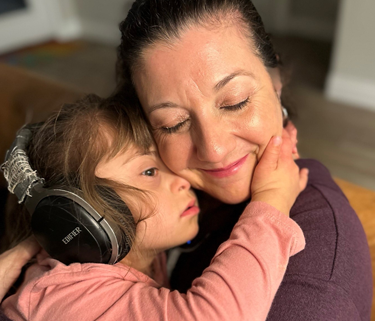The Truth About Medicaid Expansion and Disability Services
In recent debates over Medicaid’s future, some have suggested that extending coverage to low-income adults through Medicaid expansion has diverted resources away from people with intellectual and developmental disabilities (IDD) and undermined the program’s original purpose.
That claim is both misleading and dangerous. It risks turning vulnerable communities against one another and distracting from the real threats facing Medicaid that come from significant cuts.
Medicaid Expansion and HCBS Waiting Lists Are Not Connected
The argument that Medicaid expansion led to longer waiting lists for people with disabilities who need home and community-based services (HCBS) is often repeated but easily disproven.
There is no correlation between whether a state expanded Medicaid and whether its HCBS waiting list grew. 10 of the 11 states without HCBS waiting lists are expansion states, and the two states with the largest waiting lists—Texas and Florida—are non-expansion states. In fact, Texas’ waiting list alone represents nearly half of the nation’s total.
Because HCBS programs are optional services within Medicaid, states control their own waiver programs, including how many people are served and how much funding is allocated. Thanks to growing support for HCBS, Medicaid has made significant progress in shifting long-term care away from institutions and into the community. In 2022, 65% of long-term services and supports (LTSS) spending went to HCBS, compared to only 18% in 1995.
Blaming Medicaid expansion for state-level decisions about HCBS funding misrepresents how the program works and distracts from the need for stronger investments in these essential services.
Cutting Medicaid Funding Won’t Help People With Disabilities
Reducing or eliminating federal funding for the Medicaid expansion population would not free up money for people with IDD; it just means less funding overall for the entire program.
Medicaid is a vital part of our social safety net, which ensures that everyone who needs care can get it, whether they are managing a chronic condition, caring for a child with disabilities, or working a low-wage job without access to employer-provided coverage.
We should be fighting to expand services and reduce waiting lists, not blaming other groups of enrollees for long-standing systemic challenges.
A Medicaid Program That Works for Everyone Is the Goal
The truth is Medicaid expansion has strengthened the program overall by bringing in new resources to support people and expanding access to care for millions of people, including many with IDD and care workers. Many people with serious health conditions and disabilities do not meet the strict disability eligibility standards necessary to access Medicaid through the Supplemental Security Income program (SSI) or do not want to impoverish themselves to meet the SSI income and asset limits.
Medicaid expansion has helped many people with disabilities access critically needed health care. What endangers HCBS and other critical supports for people with disabilities are proposals to slash federal support for Medicaid under the pretext of targeting waste, fraud, and abuse within the program.
We should be investing in HCBS, increasing pay for caregivers, and expanding access to LTSS, not rolling back coverage or undermining Medicaid’s foundation.





 Born at 27 weeks and just over 2 pounds, Logan was small enough to fit in the palm of his mom’s hands. He spent a month in the neonatal intensive care unit on heart monitors and chest tubes, and his lungs collapsed twice. The doctors told his mom that Logan would never talk or speak and that he would be a “vegetable.” But they were wrong.
Born at 27 weeks and just over 2 pounds, Logan was small enough to fit in the palm of his mom’s hands. He spent a month in the neonatal intensive care unit on heart monitors and chest tubes, and his lungs collapsed twice. The doctors told his mom that Logan would never talk or speak and that he would be a “vegetable.” But they were wrong. The current SSI asset limit means that Logan can’t open his own cattle business, since even owning one steer would put him over the limit.
The current SSI asset limit means that Logan can’t open his own cattle business, since even owning one steer would put him over the limit.
 Charlotte is an advocate with Down syndrome who was born with a congenital heart defect. She had to undergo multiple surgeries as a child and finally received a heart transplant in 2012. The journey to get her heart transplant had its challenges, but she used her experience to fight to make sure everyone had access to organ transplants. To make this a reality, Charlotte spoke with policymakers about creating a bill about organ transplant discrimination. Members of Congress created the
Charlotte is an advocate with Down syndrome who was born with a congenital heart defect. She had to undergo multiple surgeries as a child and finally received a heart transplant in 2012. The journey to get her heart transplant had its challenges, but she used her experience to fight to make sure everyone had access to organ transplants. To make this a reality, Charlotte spoke with policymakers about creating a bill about organ transplant discrimination. Members of Congress created the 

 For some, August can be a time for camping trips, beach days, and other fun summer activities. But for members of Congress, August signals the start of Congressional Recess. During August recess, U.S. senators and representatives leave Washington, DC, and travel to their home states and districts to begin a fast-paced schedule of constituent meetings, town halls, and other community events.
For some, August can be a time for camping trips, beach days, and other fun summer activities. But for members of Congress, August signals the start of Congressional Recess. During August recess, U.S. senators and representatives leave Washington, DC, and travel to their home states and districts to begin a fast-paced schedule of constituent meetings, town halls, and other community events.

 His impact on students didn’t stop in the classroom. After his career as a teacher, he went on to become the Special Education Director in Philadelphia and now teaches graduate school, supervises teachers, and was just appointed by the Governor to serve on Pennsylvania’s Special Education Advisory Panel. He also continued to volunteer with The Arc. “I think I did everything possible with The Arc.” In 2005, The Arc of Pennsylvania asked Ken to represent The Arc on the state’s Right to Education Task Force, which later led to his joining the Boards of The Arc of Philadelphia and The Arc of Pennsylvania, where he served as president of both organizations. He learned more and more about The Arc of the United States and was eager to get involved. He went to National Conventions, joined Committees, and eventually joined the national Board. “I went from organizing days at the zoo to becoming the national President—I was flabbergasted,” shares Ken.
His impact on students didn’t stop in the classroom. After his career as a teacher, he went on to become the Special Education Director in Philadelphia and now teaches graduate school, supervises teachers, and was just appointed by the Governor to serve on Pennsylvania’s Special Education Advisory Panel. He also continued to volunteer with The Arc. “I think I did everything possible with The Arc.” In 2005, The Arc of Pennsylvania asked Ken to represent The Arc on the state’s Right to Education Task Force, which later led to his joining the Boards of The Arc of Philadelphia and The Arc of Pennsylvania, where he served as president of both organizations. He learned more and more about The Arc of the United States and was eager to get involved. He went to National Conventions, joined Committees, and eventually joined the national Board. “I went from organizing days at the zoo to becoming the national President—I was flabbergasted,” shares Ken.









